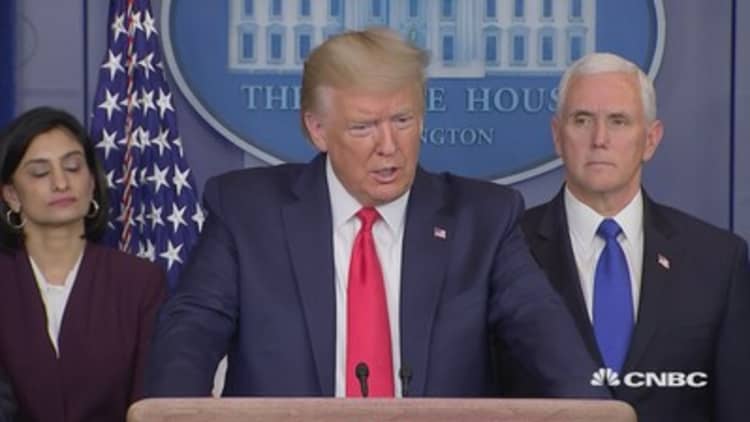
President Donald Trump on Wednesday defended his habit of calling coronavirus the "Chinese virus."
"It's not racist at all," Trump said at a White House press conference to discuss the coronavirus pandemic. "No, not at all."
Trump was asked about his persistent use of the term despite health officials saying that ethnicity does not cause the virus — and reports that dozens of incidents of bias against Chinese-Americans who have been blamed for allegedly spreading the coronavirus.
"Because it comes from China," Trump told the reporter who asked the question. "That's why."
"I want to be accurate."
The coronavirus pandemic originated in the Chinese city of Wuhan.
The White House's Twitter account later Wednesday noted that a number of past pandemics had been known by the places where they originated, or where they were believed to have originated.
"Spanish Flu. West Nile Virus. Zika. Ebola. All named for places. Before the media's fake outrage, even CNN called it 'Chinese Coronavirus,' the White House tweeted. "Those trying to divide us must stop rooting for America to fail and give Americans real info they need to get through the crisis."
Trump also said Wednesday that Chinese government officials originally "tried to say at one point — maybe they stopped saying now — that it was caused by American soldiers." The New York Times said Friday that a baseless conspiracy theory is circulating in China that U.S. soldiers who visited Wuhan last fall may have sparked the outbreak.
"That can't happen. It's not going to happen. Not as long as I'm president," Trump said of the theory.
"It comes from China," the president repeated about the virus.
Asked about Trump's use of the term, Dr. Mike Ryan, executive director of World Health Organization's emergencies program, said: "Viruses no know borders and they don't care about your ethnicity, the color of your skin or how much money you have in the bank."
"So it's really important we be careful in the language we use lest it lead to the profiling of individuals associated with the virus," Ryan said.
On Tuesday, a day before the press conference, CBS News White House correspondent Weijia Jiang, who was born in China, tweeted that, "This morning a White House official referred to #Coronavirus as the 'Kung-Flu' to my face."
"Makes me wonder what they're calling it behind my back," Jiang added.
The director of the federal Centers for Disease Control and Prevention, Dr. Robert Redfield, said last week he agreed with Rep. Lois Frankel, D-Fla., who asked him if it was "absolutely wrong and inappropriate to call this the Chinese coronavirus."
China has strongly objected to the use of the term "Chinese virus," calling it "a despicable practice."
Trump has repeatedly called coronavirus the "Chinese virus" on Twitter, including in a tweet announcing his press conference Wednesday.
In another tweet Wednesday, Trump wrote, "I always treated the Chinese Virus very seriously, and have done a very good job from the beginning, including my very early decision to close the "borders" from China - against the wishes of almost all. Many lives were saved. The Fake News new narrative is disgraceful & false!"
Secretary of State Mike Pompeo has called coronavirus the "Wuhan virus" during recent public appearances.
China Foreign Ministry spokesman Geng Shuang criticized Pompeo by name and other unnamed U.S. politicians for using such terms last week.
"We condemn the despicable practice of individual U.S. politicians eagerly stigmatizing China and Wuhan by association with the novel coronavirus, disrespecting science and WHO," Geng said at a press briefing.
"The international society has a fair judgment, and Pompeo's attempts of slandering China's efforts in combating the epidemic is doomed to fail."
Former Vice President Joe Biden, the leading contender for the Democratic presidential nomination, blasted Trump last week for using the term when the president tied it to his call for a border wall with Mexico.
"A wall won't stop a virus. Racism won't stop a virus. Do your job," Biden tweeted.
Despite his current criticism of China, Trump said in January he believed that Chinese President Xi Jinping and health officials in that country would tell authorities around the world everything they needed to know about the virus.
Losses on U.S. stock market indexes accelerated as Trump spoke at the press conference. The New York Stock Exchange at one point halted trading as the Dow Jones Industrial Average fell to a level below to what it was when Trump was inaugurated in January 2017.
Later in the press conference, Trump was asked if he believes that China has inflicted the coronavirus on the United States.
"No, I don't believe they're inflicting," he said.
But, Trump added, "I think they could have given us a lot earlier notice" about the outbreak of the virus in the city of Wuhan.
Trump announced earlier Wednesday that he and Canadian Prime Minister Justin Trudeau had agreed to temporarily close their nations' joint border, the longest in the world, to nonessential traffic in a bid to slow the spread of the pandemic.
As of Wednesday, there have been more than 210,000 cases worldwide of coronavirus, with more than 8,000 deaths. Cases in China topped 81,000. The United States has had nearly 6,500 reported cases and at least 114 deaths.



